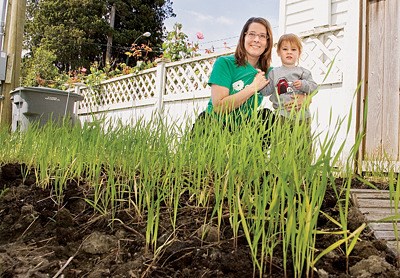Hartley Rosen got a bit of a kick out of being publicly called out for wasting taxpayers money.
When NPA city councillor and mayoral candidate Suzanne Anton held a press conference last week blasting councils decision to award $5,000 to a pilot project that would see front lawns in Vancouver turned into miniature wheat fields, Hartley says interest in his program spiked.
I think its great. I relish the opportunity, says the senior manager of the Environmental Youth Alliance (EYA), a non-profit organization co-ordinating the Lawns to Loaves project. Hartley says Antons comments opened the door for greater awareness of the experiment that has seen about 25 Vancouver residents donate their lawns to urban grain production which will then be milled and turned into local bread.
Hartley acknowledges that at first glance, many agree with Antons assessment of the project as silly, but upon further inspection may reconsider.
If it were just about producing wheat or grain in the city and the taxpayers were paying for that Id say she probably has a point, but if you go a little deeper into the programming, you might look at it a little differently, he says.
Rather, EYA will use the municipal funds, granted through the City of Vancouvers Greenest City Neighbourhood Grants program, to bring Lawns to Loaves to four local schools to educate kids on how their daily bread is made.
Well do presentations about the history of agriculture and the history of grain production and how it has been so important in terms of the history of civilizations and migrations of people all over the world, he says.
The EYA will also help schools grow their own wheat on site. Hartley sees the project as a natural fit for a city that aspires to be the greenest in the world by 2020 and aligns with the EYAs mandate of providing programming designed to stoke kids interest in conservation and environmentalism. Food brings all those things together, plus you get to have great, healthy, nutritious food in the end.
Another aspect of Lawns to Loaves seeks to connect urban wheat farmers with local bakeries who will use the grain to produce 100-per-cent local bread. While Hartleys under no illusions Lawns to Loaves will replace industrial agriculture, he says the projects ultimate goal is to bring community together and educate about local food production.
The $5,000 city grant will go to purchasing seed, buying materials for plant beds, purchasing a mill and hiring someone to manage the project and prepare the school curriculum. The grant is the only funding the project has received. We can run the program with zero dollars, but we can do a much more comprehensive educational program with this funding, says Hartley.
The prospect of eating bread baked from homegrown wheat led Revel Warkentin to turn over an 8 by 11-square-foot chunk of her lawn for the pilot project.
A busy mom and an unsuccessful green thumb, Warkentin says growing wheat has been an easy entry point into local food production.
It turns out wheat doesnt need much, she says. Warkentin heard about the project through a neighbourhood e-mail list and attended an information session where she received free seed and information on how to sow and care for her crop. If all goes well this growing season, Warkentin says she can look forward to yielding about 15 cups of flour enough for about four loaves of bread or 12 recipes worth of blueberry pancakes.
It may be a small amount, but Warkentin says the experiment will yield dividends in building community. Next year, I know personally probably three or four families that are going to do it.
As for whether Lawns to Loaves is an appropriate use of municipal coffers? Warkentin believes it is. I didnt think I could grow wheat, and now I know I can. A lot of people are intimidated by growing.



